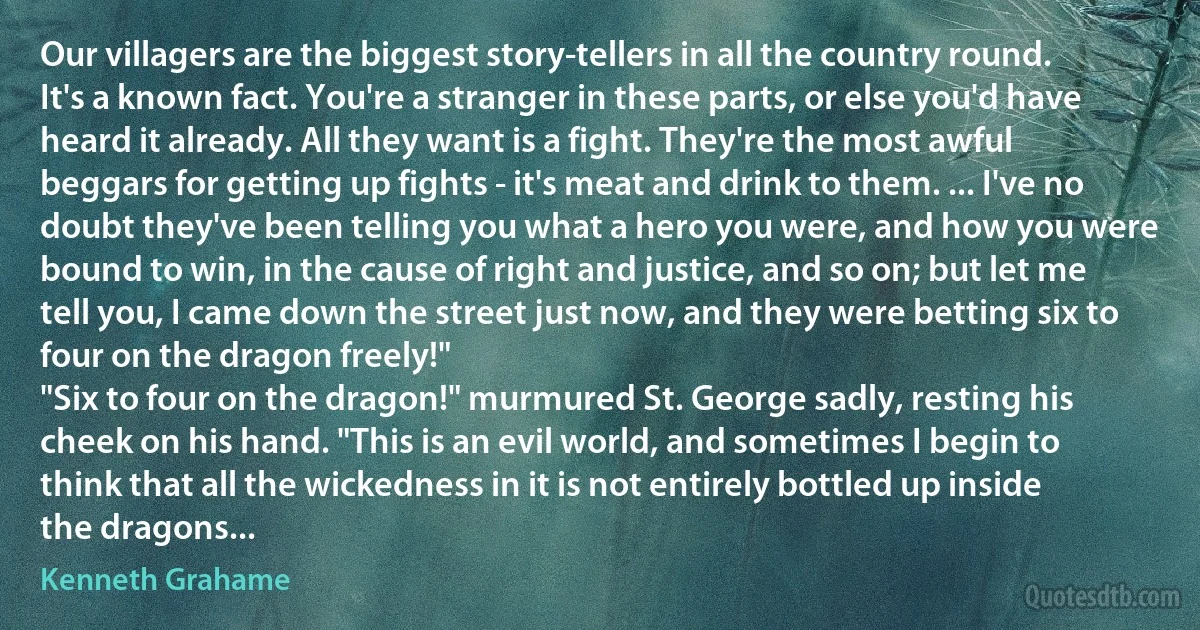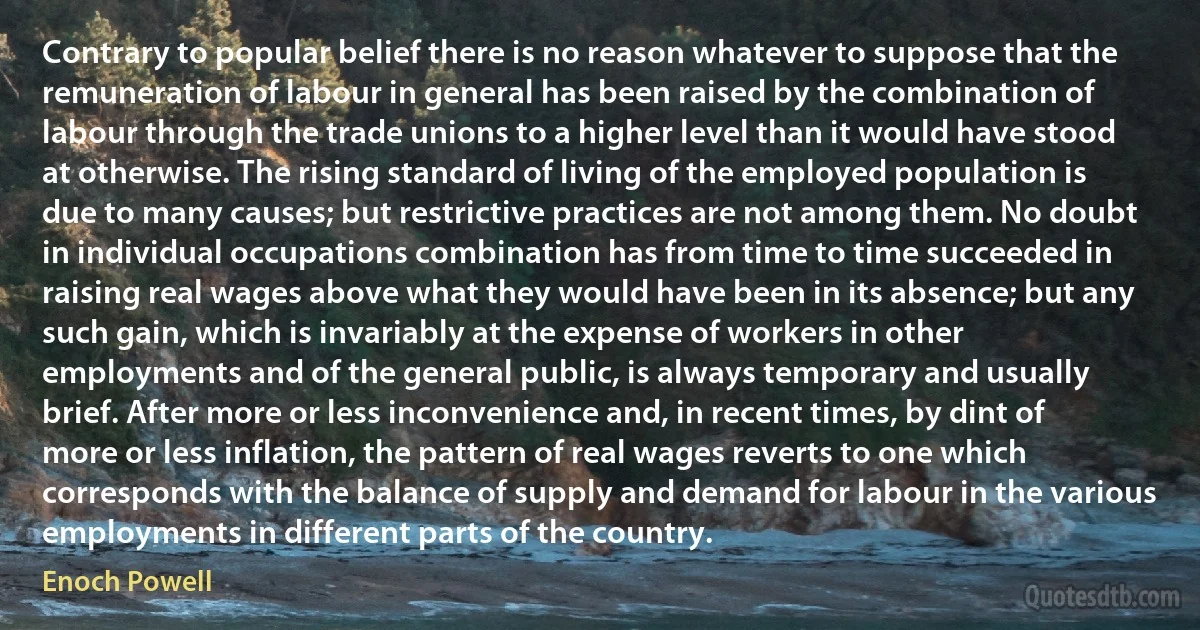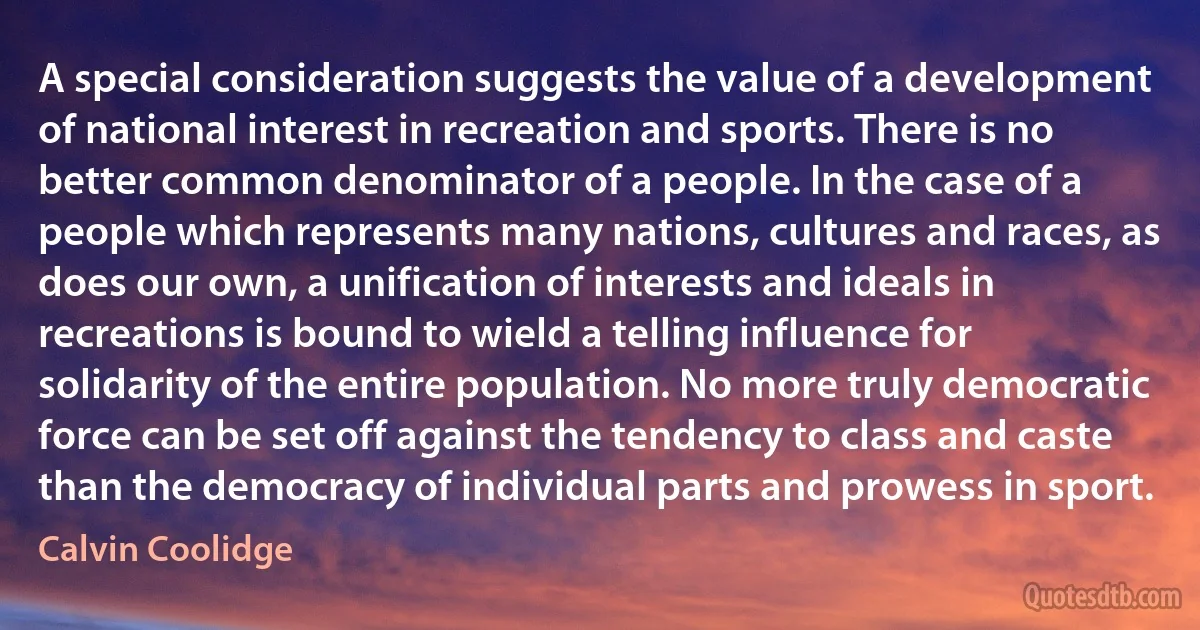Parts Quotes - page 87
I have no sympathy at all with the new Radicalism of which Sir William Harcourt is now a conspicuous supporter, although a recent convert. I have no sympathy with the policy of men whose representatives abet and aid the projects of the enemies of this country (hear, hear)-the men who whine over the fate of Lobengula, but denounce as murderers the British officers and the brave Englishmen, who, at the risk of their lives and fortunes in all parts of the world, are doing their part to maintain the great Empire of the Queen. (Cheers.) I have no sympathy with men who apparently approve of French aggression, and who at the same time deprecate any increase of the British Navy; or with those who preach consistently in all parts of the world, in Africa, in Asia, and in Ireland their favourite doctrine of "Scuttle."

Joseph Chamberlain
To me politics is just a matter of getting the engineering right. If you have a machine which functions properly without much attention, then it's obviously a good machine. That's what politics should be about. And if the machine has simple working parts which any layman can understand, then it's, as it were, your democratic machine. Am I right or am I wrong?”
"Crazy,” said Makhno, and scratched his nose.
"What?”
"You're not right or wrong. You're crazy.

Michael Moorcock
The organ banks would be supplied for years. Not only would the crew have a full supply, which they always did anyway, but there would be spare parts for exceptional servants of the regime; i.e., for civil servants such as Jesus Pietro and his men. Even the colonists would benefit. It was not at all unusual for the Hospital to treat a sick but deserving colonist if the medical supplies were sufficient. The Hospital treated everyone they could. It reminded the colonists that the crew ruled in their name and had their interests at heart.
And the Sons of Earth was dead. All but one man, and from his picture he wasn't old enough to be dangerous.
Nonetheless Jesus Pietro had his picture tacked to the Hospital bulletin boards and sent a copy to the newscast station with the warning that he was wanted for questioning.
It was not until dawn, when he was settling down to sleep, that he remembered who belonged to that face. Matthew Keller's nephew...

Larry Niven
We're going to return the republic. We'll never be perfect but my God we're not going to keep babies alive and harvest their organs. We're not going to sell their parts for women's cosmetics. We're not gonna have Pepsi with baby flavoring in it. I mean what the Hell have we become. Excuse me but I'm tired of it.

Alex Jones
With inherited liberal principles, I feel that the free movement of all people is a good thing and one to be encouraged. ... The Declaration of Human Rights has for one of its Articles the right of the human being to take a nationality, to change it, and not to be denied the right arbitrarily to change it. I realise it is not as easy as that, but most of the difficulties are definable difficulties based on facts and situations which the economic planners now available to Government Departments should be able to grasp and measure. I believe that the basic problem which prevents more immigration is an economic one. ... [T]here is a nearer approach to the ideal of universal admission in the United States than there is here. I think we could learn something from that. ... If we were to work out some form of migration policy based on these lines we would be doing some service to that free movement of populations which is a vital prerequisite to understanding in all parts of the world.

Tony Benn
The British Constitution is an interesting contraption. I hope that is not too Burkeian a sentiment for a Thomas Paine-ite like myself to utter. There are many parts of it which die of apathy or inanition, and at the proper moment such parts have to be lopped off. That is what I should like to do with the House of Lords.

Michael Foot
Society as a whole, he reminded himself, must be protected against the individual, just as a human body must be protected against malfunction of any of its parts. As fond as you might be of your gall bladder, you would sacrifice it mercilessly if it were going to impair the rest of you.

Robert Sheckley
I would say that it is a fearful doctrine, which must recoil upon the heads of those who pronounce it, to stand in judgment on a fellow human-being and to say, "Because he was such-and-such, therefore the consequences which would otherwise flow from his death shall not flow." ... Nor can we ourselves pick and choose where and in what parts of the world we shall use this or that kind of standard. We cannot say, "We will have African standards in Africa, Asian standards in Asia and perhaps British standards here at home." We have not that choice to make. We must be consistent with ourselves everywhere. All Government, all influence of man upon man, rests upon opinion. What we can do in Africa, where we still govern and where we no longer govern, depends upon the opinion which is entertained of the way in which this country acts and the way in which Englishmen act. We cannot, we dare not, in Africa of all places, fall below our own highest standards in the acceptance of responsibility.

Enoch Powell
His political thought and concern found genesis in the socialist movement and ideology. Gandhi had been a deep influence on his ideas and personality. He was an erudite leader. He edited an important journal of the socialist movement, "Sangharsh", which was initially brought out by his political guru Acharya Narendra Dev. He edited another journal Young Indian in Hindi as well as in English. In the 19 months of his imprisonment during the Emergency he wrote a diary, published in two parts under the title "Meri Jail Diary".

Chandra Shekhar
The strength of the House of Commons is dissipated, its time consumed, and its dignity and reputation are threatened by the attempt to manage in one Assembly the purely local interests of different parts of the United Kingdom. Without some large measure of Devolution in the United Kingdom the House of Commons cannot attend to Imperial affairs and matters which concern the country as a whole.

Edward Grey, 1st Viscount Grey of Fallodon
The Republic of Mhari contains five thousand times more cells than there are humans on earth, but is somehow both more and less than the sum of her parts. If all those cells die, then I am, by definition, dead. But the relationship between cell-citizens and the Republic of Me is less obvious than you might think.
At any point in time some of my cells are dying and being replaced, and the me that exist today consists almost entirely of different cells from the me of a couple of years ago-although I'm still me. But if you were to separate all my cells and then keep them alive in a mad scientist's test-tube collection, I'd be dead, though all my bits live on. The Republic of Self can be dissolved, or taken over in a coup, or drastically reformed. I harbor this illusion of unitary identity-but in reality I'm what biologists call a superorganism, a swarm, and ensemble entity. I am not me: I am Hobbes's Leviathan, or Leviathan's Representative.

Charles Stross
Caste has no foothold in Santo Domingo. It is capable of supporting the entire colored population of the United States, should it choose to emigrate. The present difficulty, in bringing all parts of the United States to a happy unity and love of country grows out of the prejudice to color. The prejudice is a senseless one, but it exists. The colored man cannot be spared until his place is supplied, but with a refuge like San Domingo his worth here would soon be discovered, and he would soon receive such recognition to induce him to stay; or if Providence designed that the two races should not live to-gether he would find his home in the Antilles.

Ulysses S. Grant
Above all, history – social and economic structure – and politics divided the revolutionary zone into two parts, whose extremes appeared to have little in common. Their social structure differed fundamentally, except for the substantial and pretty universal prevalence of countrymen over townsmen, of small towns over big cities; a fact easily overlooked, because the urban population and especially the large cities were disproportionately prominent in politics.

Eric Hobsbawm
We are today more familiar than the men of the mid-nineteenth century with this drawing together of all parts of the globe into a single world. Yet there is a substantial difference between the process as we experience it today and that in the period of this book. What is most striking about it in the later twentieth century is an international standardization which goes far beyond the purely economic and technological. In this respect our world is more massively standardized than Phileas Fogg's, but only because there are more machines, productive installations and businesses.

Eric Hobsbawm
Spinoza is unsuitable as a patron philosopher of any contemporary movement, including the environmental and ecological. His system and his thinking in general are overwhelmingly complicated, and his terminology in central areas utterly foreign to contemporary jargons. But this does not exclude the possibility that he is an inexhaustible source of inspiration for those who look for a philosophy explicating deep attitudes and assumptions within certain parts of the international ecological and environmental movement. Admirers of Spinoza quite naturally tend to interpret him so as to minimize the conflicts between his and their thought. The result is a variety of representations of Spinoza. But if the intention is to provide more or less free reconstructions, well and good. And this is what is relevant, as I see it, in relation to what is sometimes called the "deep ecological movement" and the "green philosophy and ecopolitics."

Baruch Spinoza
Think about it for a second. What does it say about corporate media coverage of the major issues facing our country when my candidacy, alone, accounted for the majority of attention (limited though it may have been) that network Sunday news shows paid to poverty, one of the great crises facing the nation? The point here is not my role in raising the issue of poverty (and other important issues). The point is how national television coverage doesn't raise it and ignores the reality of important parts of American life.

Bernie Sanders
The Department of Homeland Security defines the Defense Industrial Base as "the worldwide industrial complex that enables research and development, as well as design, production, delivery and maintenance of military weapons systems, subsystems, and components or parts, [emphasis added]. The Defense Industrial Base provides "products and services that are essential to mobilize, deploy, and sustain military operations." Does it include regular commercial services purchased by the US military? No. The definition specifically excludes the purchase of regular commercial services. Whatever makes Google a "key member of the Defense Industrial Base," it is not recruitment campaigns pushed out through Google AdWords or soldiers checking their Gmail.

Julian Assange
The universal propensity to believe in invisible, intelligent power, if not an original instinct, being at least a general attendant of human nature, may be considered as a kind of mark or stamp, which the divine workman has set upon his work; and nothing surely can more dignify mankind, than to be thus selected from all other parts of the creation, and to bear the image or impression of the universal Creator. But consult this image, as it appears in the popular religions of the world. How is the deity disfigured in our representations of him! What caprice, absurdity, and immorality are attributed to him! How much is he degraded even below the character, which we should naturally, in common life, ascribe to a man of sense and virtue!

David Hume
The chief attraction of homosexual activity is that it does not require confidence or male identity or even face-to-face self-exposure. It can even be informed without an erection. It is thus an inviting escape for the fallen male. Nonetheless, actual homosexuality is by no means inevitable in such cases. A man can recover from his dejection, restore hos confidence, and return to full heterosexuality. This is the usual course of events. It is tragic, therefore, if the cultural ambience provides more easily for homosexuality than for recover of normal patterns. In many parts of urban America this tragedy is a way of life.

George Gilder



